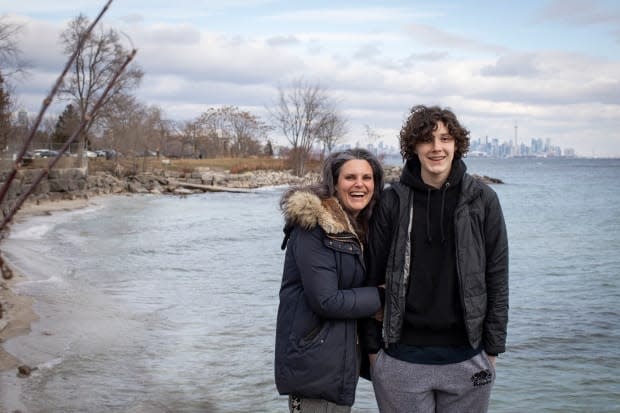Teens feeling disconnected, hopeless due to COVID-19 raises alarm for parents, experts

Ten months into the coronavirus pandemic, Toronto teen Serena Sri is sorely missing all the "amazing" things about adolescent life, from spirit days, intramural sports and learning in-person at her high school in the city's west end to hanging out with friends and attending her beloved hip-hop dance class.
"I'm really a social person and I love being around people. With the pandemic, we can't do that," she said.
"I kind of feel more alone and I kind of... shut down in a sense. And I lose my motivation to do anything, even simple things in my daily life."
The pandemic has also had a negative effect on Edmonton student Quinncy Raven-Jackson, who says a more solitary life under COVID-19 restrictions has exacerbated the anxiety disorder he's been dealing with.
"I have difficulty with social interaction sometimes, so not seeing people, I sometimes forget how much these people care about me and stuff like that. So it was very lonely," said the 19-year-old University of Alberta freshman.
"I have a good relationship with both my parents and a great therapist, so I had some safe adults to speak to, fortunately. But even when you have those kinds of help, it doesn't always really resonate."

The COVID-19 pandemic has left many teens and young Canadians feeling disconnected, hopeless and unmotivated to navigate school and daily life — and this sentiment is causing concern for parents and experts alike.
"Everyone's normal has now changed into something completely different from what it was 10 months ago," said Sadia Fazelyar, a post-secondary student and youth mental health advocate for Jack.org, a national charity focused on young Canadians.
"The biggest thing I hear from youth is it's this whole new thing that nobody really knows how to navigate properly."
Many young people aren't comfortable speaking up about difficulties, feelings or mental health struggles they're facing, so they look to sports, the arts, clubs or social groups as a form of support, Fazelyar says. "Now it's all been taken away from them and it really hits them hard."
WATCH | What would young Canadians tell their pre-pandemic selves?
Seeing classmates, friends or family through a screen, even regularly, doesn't offer the same opportunity for connection, added the 21-year-old Ryerson University student.
"Youth feel alone. And it's kind of hard to have that conversation or even to bring it up … because it feels like they shouldn't be alone. They get to talk to their classmates five days a week on Zoom in the classroom. They can call their friends. They get to be with their family, but it's just not the same."
Concern about the mental well-being of Canada's youth is rising. A child mental health research team spearheaded by Toronto's Hospital for Sick Children is currently conducting a study into the effect COVID-19 is having on the mental health of young Canadians. Ottawa clinics and support groups are seeing a spike in demand for mental health resources, while medical officials in Calgary have noted a rise in cases of eating disorders.
Wanting to explore what kids and teens are thinking and feeling about COVID-19, Nikki Martyn, program head of early childhood studies at the University of Guelph-Humber, launched a research project analyzing artwork created by youngsters in response to the pandemic.
Though submissions came from children as young as two years old, the majority were by 14- to 17-year-olds, says the educator and child psychology researcher. "It shows how much teenagers really want to be heard and have so much to say."
The artworks include illustration, painting, sculpture, mixed-media creations, even musical compositions, and the message within them is clear, according to Martyn: It's a painful time and young people are struggling.
WATCH | Social isolation, school closures take a toll on mental health of teens:
"They're feeling sad and alone and isolated and worried and scared. They feel lack of motivation and distress and failure," she said.
"What I worry about is the helplessness or the disillusionment about their own future. Sometimes even anger, which we all understand. It's the same things in some ways that we're feeling as adults, but it's different because of where they're at developmentally at this time of their life."
The writing and phrases included within some of the artwork — "What's the point? No one cares. This is too much. I am not OK. Broken' — speak volumes, Martyn added.
"The teens were able to share this perspective and their experience very clearly. I think it's really important that we listen to it."

'It's OK to not be OK now'
Martyn says she believes these pandemic-inspired feelings go beyond the already powerful emotions and stresses teens have in regular times, but that this moment also presents families with an opportunity to normalize open discussion about mental health.
She suggests parents open up to their kids and teens about their own vulnerabilities, sharing when they themselves are feeling drained, that they've had enough or that they also can't wait for this all to be over.
"It's OK to not be OK now," she said.

Ashanty Sri is worried about the toll the pandemic is taking on her daughter Serena, who has also been diagnosed with anxiety. She wonders about what longer term effect there may be on today's teens, who are navigating growing up without the social, classroom and even part-time job experiences they're used to.
For now, the mother-daughter duo are putting the focus on mental wellbeing by taking small steps, noted the Toronto elementary school teacher. Getting active outdoors has helped, added Serena.
"Making sure that I'm still like going outside for walks, even though it's only with my mom... Also a great outlet is talking to somebody like a counselor or a therapist, because I feel like it helps releasing everything."
Maintaining connections with peers is another recommendation from Fazelyar, the youth mental health advocate — things like regular phone or video calls with friends, online game nights, watching movies together via apps or, if local restrictions permit, physically distanced time outdoors.
"You should still be 'being social,'" Fazelyar said.
"When you're thrown into this or you feel like you're kind of alone because you don't have your friends or social network, it's just best to find new ways to adapt."

 Yahoo Finance
Yahoo Finance 